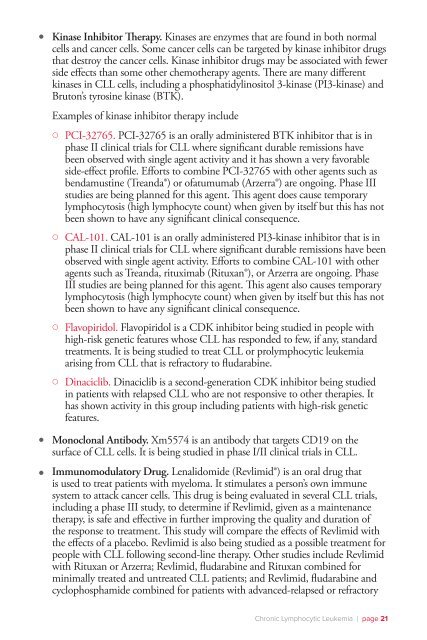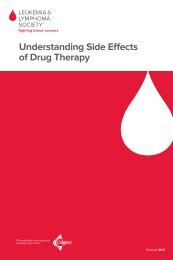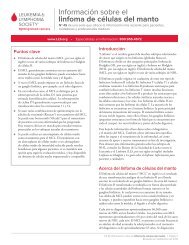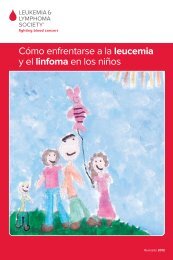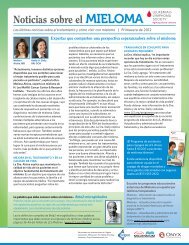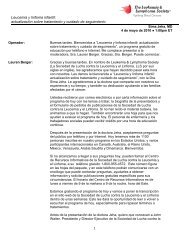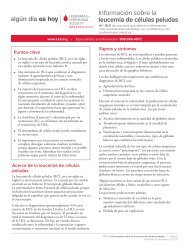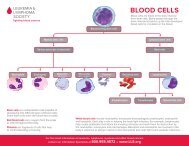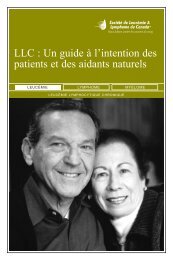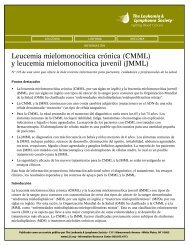Chronic Lymphocytic Leukemia - The Leukemia & Lymphoma Society
Chronic Lymphocytic Leukemia - The Leukemia & Lymphoma Society
Chronic Lymphocytic Leukemia - The Leukemia & Lymphoma Society
You also want an ePaper? Increase the reach of your titles
YUMPU automatically turns print PDFs into web optimized ePapers that Google loves.
Kinase Inhibitor <strong>The</strong>rapy. Kinases are enzymes that are found in both normal<br />
cells and cancer cells. Some cancer cells can be targeted by kinase inhibitor drugs<br />
that destroy the cancer cells. Kinase inhibitor drugs may be associated with fewer<br />
side effects than some other chemotherapy agents. <strong>The</strong>re are many different<br />
kinases in CLL cells, including a phosphatidylinositol 3-kinase (PI3-kinase) and<br />
Bruton’s tyrosine kinase (BTK).<br />
Examples of kinase inhibitor therapy include<br />
{ { PCI-32765. PCI-32765 is an orally administered BTK inhibitor that is in<br />
phase II clinical trials for CLL where significant durable remissions have<br />
been observed with single agent activity and it has shown a very favorable<br />
side-effect profile. Efforts to combine PCI-32765 with other agents such as<br />
bendamustine (Treanda®) or ofatumumab (Arzerra®) are ongoing. Phase III<br />
studies are being planned for this agent. This agent does cause temporary<br />
lymphocytosis (high lymphocyte count) when given by itself but this has not<br />
been shown to have any significant clinical consequence.<br />
{ { CAL-101. CAL-101 is an orally administered PI3-kinase inhibitor that is in<br />
phase II clinical trials for CLL where significant durable remissions have been<br />
observed with single agent activity. Efforts to combine CAL-101 with other<br />
agents such as Treanda, rituximab (Rituxan®), or Arzerra are ongoing. Phase<br />
III studies are being planned for this agent. This agent also causes temporary<br />
lymphocytosis (high lymphocyte count) when given by itself but this has not<br />
been shown to have any significant clinical consequence.<br />
{ { Flavopiridol. Flavopiridol is a CDK inhibitor being studied in people with<br />
high-risk genetic features whose CLL has responded to few, if any, standard<br />
treatments. It is being studied to treat CLL or prolymphocytic leukemia<br />
arising from CLL that is refractory to fludarabine.<br />
{ { Dinaciclib. Dinaciclib is a second-generation CDK inhibitor being studied<br />
in patients with relapsed CLL who are not responsive to other therapies. It<br />
has shown activity in this group including patients with high-risk genetic<br />
features.<br />
Monoclonal Antibody. Xm5574 is an antibody that targets CD19 on the<br />
surface of CLL cells. It is being studied in phase I/II clinical trials in CLL.<br />
Immunomodulatory Drug. Lenalidomide (Revlimid®) is an oral drug that<br />
is used to treat patients with myeloma. It stimulates a person’s own immune<br />
system to attack cancer cells. This drug is being evaluated in several CLL trials,<br />
including a phase III study, to determine if Revlimid, given as a maintenance<br />
therapy, is safe and effective in further improving the quality and duration of<br />
the response to treatment. This study will compare the effects of Revlimid with<br />
the effects of a placebo. Revlimid is also being studied as a possible treatment for<br />
people with CLL following second-line therapy. Other studies include Revlimid<br />
with Rituxan or Arzerra; Revlimid, fludarabine and Rituxan combined for<br />
minimally treated and untreated CLL patients; and Revlimid, fludarabine and<br />
cyclophosphamide combined for patients with advanced-relapsed or refractory<br />
<strong>Chronic</strong> <strong>Lymphocytic</strong> <strong>Leukemia</strong> I page 21


